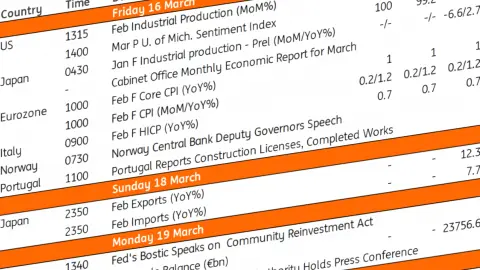Key events in developed markets next week
Will the new Fed chair result in a new Fed dot plot? Will the EU summit offer any sign of a Brexit transition deal?
New Fed chair, new dot plot?
For markets, there’s little doubt that a rate hike is on the way next week. Of the possible risks that may have knocked the Fed off course this month – a government shutdown, market turmoil, or data distortions from the cold weather – none have really come to pass.
So with a hike fully priced in, investors will instead be closely scrutinising the Fed’s infamous 'dot plot' for any sign that the Fed, with a new chair at the helm, is considering upping the pace of hikes from three to four this year. Back in December, only four out of 16 Fed members expected four hikes in 2018, so arithmetically it will take another four or five to join this camp for the median dot to move upwards.
Whatever happens, with core inflation on the verge of returning to target and the economy continuing to perform strongly, we think the Fed will ultimately follow through with four rate rises this year.
Crunch EU summit eyed for signs of Brexit transition deal
With negotiators scrambling to get a transition period agreed in principle ahead of the EU leader’s meeting at the end of the week, there are signs that a deal may be in sight. The UK government appears to have accepted the EU’s request for a shorter transition – after all, negotiating a longer period now would mean agreeing to additional budget contributions beyond December 2020, which would be politically very challenging for Theresa May at this stage.
That was one of the final sticking points in the transition negotiations, although there are still big disagreements over the Irish border. The EU has said that the UK government’s proposal for post-Brexit trade doesn’t go far enough to ensure there's no hard border. Whilst this issue is unlikely to be resolved anytime soon, there’s a risk that disagreements in this area delay a transition deal.
Will Eurozone indicators recover?
For the Eurozone, the question will be whether survey indicators recover after financial market volatility in February. Markets bounced back somewhat, but some of the surveys also indicated weakness in new orders. And with recent protectionist moves in the US, uncertainty about global economic conditions has not really subsided, suggesting March could be another soft month.
Only one number matters ahead of the Bank of England
In the UK, there are several economic reports of note:
- Core inflation looks set to grind lower as the effect of the pound’s plunge continues to filter out (this process could see core CPI virtually back to target by the end of the summer).
- Retail sales could be a tad disappointing, as cold weather, combined with an ongoing squeeze in household income appears to have kept shoppers away from the high street in February.
- But what really matters for policymakers next week is wage growth. It looks as though the overall tightness in the jobs market is putting pressure on firms to lift pay – although it’s also worth remembering that the year-on-year numbers are currently being flattered by the particularly weak wage figures at the same time last year.
Assuming progress can be made towards a Brexit transition period, we think the BoE will hike rates again in May. Keep an eye out for possible hints at this in the Bank’s statement next week.
Relief over new German government or fear of US protectionism?
Next week will see an entire wave of German sentiment indicators. The big question all these indicators should answer is whether the relief of having a new government can outweigh fears of rising protectionism from the US.
Developed Markets Calendar

This publication has been prepared by ING solely for information purposes irrespective of a particular user's means, financial situation or investment objectives. The information does not constitute investment recommendation, and nor is it investment, legal or tax advice or an offer or solicitation to purchase or sell any financial instrument. Read more
Download
Download article
16 March 2018
Our view on next week’s key events This bundle contains 3 Articles




